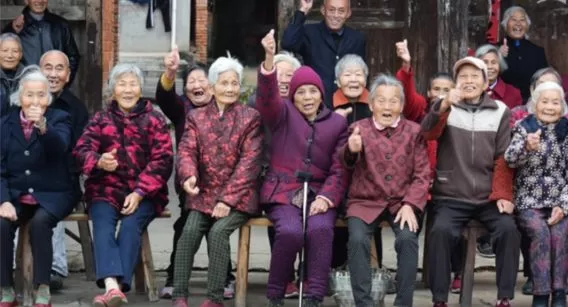China's Ageing Population: 2035 Projection and Coping Strategies
China is set to transition into a moderately ageing society in the next three years, with 20 percent of its population aged 60 and above. By 2035, it will become a severely Ageing society, with a staggering 400 million individuals in this age group, making up 30 percent of the total population.
These projections were shared by Wang Haidong, the director of the Department of Aging and Health at the National Health Commission, during a recent press briefing.
Wang highlighted the significant challenges posed by China's rapidly ageing population, particularly due to its sheer size. The situation varies across regions, with rural areas experiencing a larger and more severe ageing problem compared to urban areas.
Data from 2020 revealed that 10 provincial-level regions already have over 20 percent of their population aged 60 and above, primarily located in Northeast and Southwest China.
The pressure to address this ageing scenario is immense. Wang emphasized that key metrics, such as the number and percentage of elderly people, the old-age dependency ratio, and the social dependency ratio, are expected to peak around 2050. This will undoubtedly strain public services and the sustainability of the social security system.

In response, China is formulating national strategies to tackle this issue and develop a unique path forward. Wang provided insights into current developments in eldercare. As of 2021, the pension system covered 1.03 billion people, while health insurance extended to 1.36 billion out of a total population of 1.4 billion. Initiatives for long-term care services are already underway in 49 cities, benefitting 145 million individuals.
The infrastructure for eldercare is also expanding rapidly. By the first quarter of 2022, there were 8 million beds in 360,000 care centers, along with over 1.75 million beds in medical-care centers nationwide.
Additionally, more than 40,000 learning centers have been established for the elderly to continue their education. Cultural facilities and tourist sites are also offering free or discounted access to encourage participation in recreational activities among the elderly.
As China navigates the challenges of its ageing population, these proactive measures aim to ensure the well-being and quality of life for its growing elderly demographic.

When you ask 72-year-old farmer Huanchun Cao about his pension, he chuckles. With a cigarette in hand, he looks at his wife of 45 years and shakes his head. “No pension for us,” he says. Mr. Cao represents a generation that witnessed the birth of Communist China. Like many rural and migrant workers, he hasn't been able to save much for retirement due to the lack of a strong social safety net.
China, under Xi Jinping's leadership, is facing a growing demographic crisis due to a slowing economy, reduced government benefits, and the long-lasting one-child policy. The country is running out of time to build a sufficient fund to support its increasing elderly population.
In the next ten years, approximately 300 million people aged 50 to 60 will leave the workforce in China. This group is as large as the entire population of the United States. The question of who will care for them is a pressing one.
“We might have another four or five years of work left,” Mr. Cao says as he and his wife return from gathering wood. They make around 20,000 yuan a year, but the prices they get for their crops are decreasing, making it difficult to make ends meet.
This situation is not unique to Mr. Cao. Many elderly in China are finding themselves in similar circumstances. The traditional reliance on filial piety to care for the elderly is becoming strained, with fewer children available to support their parents due to the one-child policy and economic migration.
The pension system in China is also under strain, with predictions that the fund could run dry by 2035. This has led to discussions about raising the retirement age, but economists warn that more substantial solutions are needed to avoid a future crisis.
Innovative approaches are being attempted, such as the Sunshine Care Home in Hangzhou, where residents receive care from volunteers in exchange for free accommodation. However, even with these efforts, challenges remain, and the cost of elderly care is a burden for many families.

Despite these challenges, some like 55-year-old Shuishui are finding new opportunities in what's called the “silver-haired economy.” She's optimistic and believes in staying positive, a sentiment shared by many older adults in China.
Meanwhile, back in Liaoning, Mr. Cao continues to work, heating water over a fire to cook rice. “This is just how life is for ordinary people like us,” he says, resigned to the tough life of a farmer.
As China grapples with the implications of its ageing population, more stories like Mr. Cao's and Ms. Tang's are emerging, showcasing the diverse ways individuals are navigating this demographic shift.
In bustling cities like Hangzhou, where tech giants like Alibaba and Ant thrive, the contrast with rural areas is stark. Here, the “silver-haired economy” is taking root, with seniors like Shuishui finding new careers and contributing to a growing sector focused on catering to the needs and desires of older adults.
Shuishui and her companions, elegantly dressed in traditional Chinese attire, are not just posing for social media; they represent a broader movement of seniors embracing life, staying active, and challenging stereotypes of aging.
Their efforts are not just about personal fulfillment; they also contribute to economic growth by tapping into the significant purchasing power of older consumers.
Yet, the reality for many remains far from glamorous. Back in Liaoning, where the frosty fields await the planting season, Mr. Cao continues his daily routine, knowing that his work is essential for survival. For him and others like him, the idea of retirement is a distant dream, and the prospect of relying on children or a dwindling pension fund looms large.
Meanwhile, initiatives like the Sunshine Care Home in Hangzhou provide a glimpse of hope. By combining community support with private investment, these models offer a potential solution to the growing need for elderly care. However, the challenges of funding and profitability remain significant hurdles that need to be addressed on a larger scale.
As China's population ages, the country faces a critical juncture. How it chooses to support its elderly citizens will not only impact individual lives but also shape the future of its society and economy.
The stories of Mr. Cao, Ms. Tang, Shuishui, and Grandma Feng represent just a few threads in the complex tapestry of China's ageing population. Each story underscores the need for a multifaceted approach that combines social, economic, and cultural solutions to ensure a dignified and sustainable future for all its citizens.
Click for more updates and the latest world news, along with Web stories updates. Also, get the latest news and top headlines from India and around the world at Speed News





